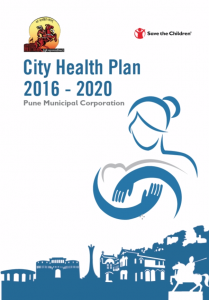
Rapid urbanization has significant repercussions on health of the people residing in the cities. The increasing movement of people from rural to urban areas often alters the characteristic of epidemiological disease profile of the city. Additional mobility-related risks among migrants include poverty, vulnerability to abuse and exploitation, weak public health system, dangerous working conditions etc. Many of these conditions affect the most vulnerable segments of the population: mothers and newborns. Needless to say, on most of the health indicators, slum dwellers and the poorer sections of urban populations fare worse than even the rural populations.
Pune, 9th largest city of India in terms of population, has prosperous history in terms of social, economic, administrative, and environmental planning and development that highlight the efforts undertaken by the administrators in managing and redesigning its urban landscape. While, Pune is investing significant resources and developing master plans and guidelines under the administrative control of Pune Municipal Corporation (PMC) for addressing key urban challenges, yet the city also faces several challenges, particularly in terms of increase in environmental degradation, social segregation, and erosion of institutional capacity to manage and govern urban growth.
About one-third of the city’s population resides in the slum or squatter settlements. Further, majority of these slums are being notified and have been there in existence for more than 15-20 years. Population density in the slums is six times more that in non-slum areas of the city. In this context, health has been considered as one of the priority areas which has got focused attention in recent years followed by sincere public-centric policy decisions to ensure availability, accessibility and affordability of health services within reach especially for urban poor.
Save the Children, India under the auspices of its flagship program “Saving Newborn Lives (SNL)”, is working in collaboration with PMC towards contributing to improvement of service delivery for the mothers and newborns of urban poor settings.
Generating new knowledge for planning, implementation and scaling up interventions that benefit the urban poor being its forte, the current collaboration will ensure urban institutional reforms and improved governance for health in urban poor settings.
A Situation Analysis (SA) study aimed to inform the design and development of city-specific, city-wide approaches to improve maternal and newborn health services for the urban poor in Pune was undertaken by Save the Children, India under the overall guidance of various stakeholders and experts in the domain of health systems, public health, maternal & child health and urban planning & governance.